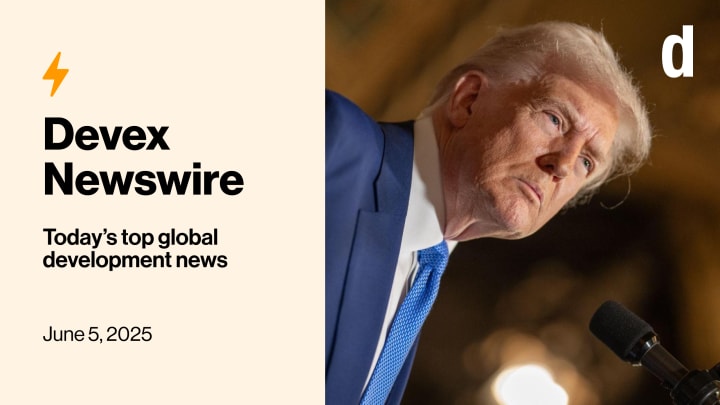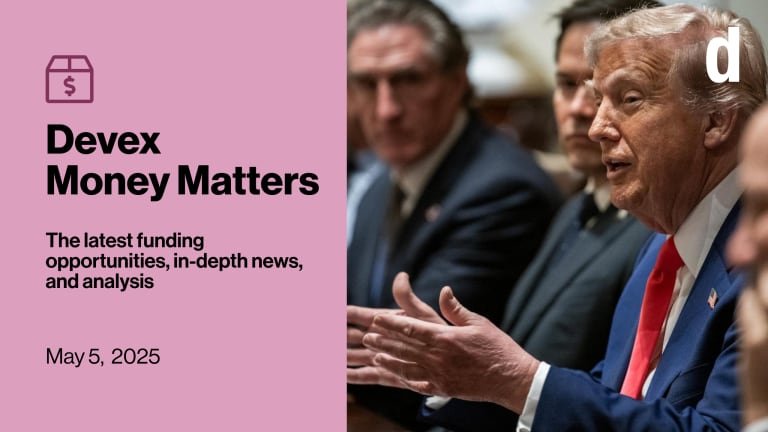
U.S. President Donald Trump’s budget proposal slashes foreign affairs funding by 85%, to the lowest in eight decades. Key aid programs would be wiped out or replaced with “America First” alternatives. It’s now up to the U.S. Congress to approve it.
Also in today’s edition: The U.S. and China are at loggerheads, and we look at who is hiring in the philanthropy sector.
This is a preview of Newswire
Sign up to this newsletter for an inside look at the biggest stories in global development, in your inbox daily.
Happening today: See you soon at 9:30 a.m. ET (3:30 p.m. CET) for our “Road to Sevilla” briefing with British International Investment’s Chris Chijiutomi to explore how DFIs are scaling capital in fragile markets. Get a behind-the-scenes look at BII’s strategy and what the next phase of engagement in Africa could look like and better understand how DFIs are prioritizing investments — and where new collaborations could take root. You can still register here, and if you can't attend live, we'll send you a recording.
The first cut wasn’t the deepest
The Trump administration wants to slash U.S. international affairs funding by a massive 85% — the steepest cut in 80 years — calling current levels “wasteful.” A $31 billion reduction plus $21 billion in rescissions would shrink foreign aid to just 0.03% of GDP.
Critics say the cuts are “deep and draconian.” U.S. Secretary of State Marco Rubio insists the $28.5 billion request for his department will deliver “a more effective and efficient” office and “aggressively aligns resources toward objectives that are in the best interests of our nation.”
Gone are development, humanitarian, and global health funds; replaced by “America First” accounts focused on “strategic investments” such as repatriations and countering China. “It looks clear that a lot of [foreign assistance] is going to be zeroed out,” says Oxfam America’s Daryl Grisgraber.
The U.S. flagship HIV initiative PEPFAR would lose $1.8 billion, and funding for Gavi, the Vaccine Alliance would be scrapped entirely. Disaster, refugee, and food aid accounts are consolidated into a single $2.5 billion fund, writes my colleague Elissa Miolene. Meanwhile, one refugee program supporting “voluntary return” of migrants would see its budget jump from $100,000 to $1.5 billion.
Even bipartisan favorites such as the Millennium Challenge Corporation and multilateral partners such as UNICEF, UNDP, and multilateral development banks face major cuts. “This presents a pretty stark picture,” says Erin Collinson of the Center for Global Development.
Congress will have the final say. But with House Speaker Mike Johnson calling it “exactly what the American people deserve,” and the first rescissions package already moving, the fight has begun.
Read: Trump unveils his full 2026 budget, with ‘draconian’ cuts to foreign aid
ICYMI: Trump budget request and rescission plan slashes global health funding
Stuck in the middle with UN
Washington took aim at Beijing’s one-child policy legacy this week, sparking a sharp diplomatic clash at a U.N. board meeting. U.S. envoy Jonathan Shrier called on the U.N. Population Fund, aka UNFPA, to cut ties with China, saying, “UNFPA should not be complicit in China’s population control.”
He slammed the agency for spending “precious” resources to assist “the second largest economy in the world” and invoked the Kemp-Kasten Amendment to justify a funding freeze, writes Senior Global Reporter Colum Lynch.
“Millions of families suffered under China’s abhorrent population control,” Shrier said at the diplomatic gathering. “Generations of women were subject to barbaric forced abortions and involuntary sterilization and continue to suffer from the harm of this excruciating legacy.”
UNFPA chief Dr. Natalia Kanem hit back, saying the U.S. decision to withhold UNFPA funding was “based on unfounded claims about UNFPA’s work that have long been disproved, including by the U.S. government itself.” She added, “UNFPA opposes coercive practice; this is why we emphasize rights and choices,” and insisted, “We do not participate and are not complicit in forced sterilization, coerced abortion, and we continue to speak out against instances of such human rights abuses.”
Then, China’s U.N. envoy Sun Lei jumped in, rejecting the “baseless accusations” and accusing the U.S. of trampling on multilateralism and putting millions at risk by yanking funds. “China urges the U.S. to rectify its wrong words and deeds and to stop obstructing UNFPA cooperation with China,” he said.
Read: Trump administration pokes panda over UN population policy
Background: UN Population Fund thought it prepared for the worst — it didn’t
Philanthropy fills in
Given a White House that dismisses climate change — and even demonizes work to mitigate it — the debate over carbon markets isn’t exactly top of mind, at least in the United States.
But during the African Development Bank annual meetings in Côte d’Ivoire, Zeph Kivungi, Africa climate director at the Children’s Investment Fund Foundation, made the case for why that should change.
Kivungi argued that philanthropic capital has a crucial role to play in scaling up investment in carbon markets — particularly when it comes to creating the conditions that make private sector involvement viable, my colleague Ayenat Mersie writes. He outlined three specific ways that philanthropy can unlock carbon markets: building hospitable environments, preparing projects for private investment, and overseeing implementation.
On enabling environments, for example, Kivungi said that without early philanthropic investment, many governments will simply walk away. “Usually, some government wants to say, ‘Show me where the money is coming from.’ So they will not see that money unless there is an enabling environment that would cost money to get that to happen.”
Read: How can philanthropy move carbon markets forward? (Pro)
+ Not yet a Pro member? Start your 15-day free trial today to access all our expert analyses, insider insights, funding data, exclusive events, and more.
Foundations fill the gap
As foreign aid freezes ripple through the development world, foundations are stepping in — and hiring. While overall job postings are down from 2024, philanthropic roles on the Devex job board are up by more than 38%.
My colleague Kristiana Louise Ortega reviewed over 700 listings and found top foundations actively recruiting — including the Gates Foundation, Rockefeller Foundation, and Mastercard Foundation, with roles from internships to senior-level full time positions across five continents.
Read the full roundup: The top foundations hiring for development roles (Career)
+ A Devex Career Account membership lets you unlock the article and enjoy other benefits such as regular reports analyzing development career trends, access to the full Devex job board, invite to exclusive events for insights and advice from top career coaches and sector leaders, and more. Start your 15-day free trial now.
Jordan’s localization unravels
Jordan’s aid sector, once a success story for its level of localization — remember when we talked about localization all the time? — is now facing mass layoffs and program cuts. The fact that the aid system relied strongly on Jordanian organizations to deliver aid means that for NGOs such as the Institute for Family Health, which offers free health care to women and children, they can’t just pack up and leave the way an international NGO might.
“Unlike many international NGOs that can close their premises, we can’t do that,” says Institute for Family Health’s Adnan Abu al-Haija. “We are here. We are blamed because [patients] know us.”
USAID provided more than 40% of the aid money in Jordan, and U.N. cuts are biting harder as well. An estimated 5,000 local aid workers could lose their jobs. “USAID in Jordan is an entire economic ecosystem,” says Dima Toukan of the Middle East Institute think tank.
Now, small NGOs are fighting over scraps, writes Clothilde Goujard for Devex. “The competition to get funding was very, very hard before USAID cuts, and now it has become much harder,” says Esraa Mahadin, a local NGO founder.
“The trust is broken,” she says. “We will not trust the US fund again.”
Read: Jordan's success at localization comes back to bite its aid sector
In other news
The U.S. yesterday vetoed a U.N. Security Council resolution calling for “unconditional and permanent” ceasefire in Gaza. [BBC]
Evangelical leader Johnnie Moore will now lead the controversial Gaza Humanitarian Foundation. [The Guardian]
India has opposed the Asian Development Bank’s approved $800 million loan to Pakistan, citing concerns that the funds could be diverted to military spending. [Bloomberg]
Sign up to Newswire for an inside look at the biggest stories in global development.




